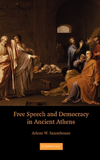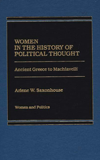People

Arlene Saxonhouse Caroline Robbins Collegiate Professor Emerita of Political Science and Women’s Studies awsaxon@umich.edu | homepage
My current research is devoted to questions of democratic accountability, that is, how we assess who is responsible for the actions of a city in a democratic regime. The problem of responsibility raises issues of justice, leadership, and engagement. In order to explore the nature of democratic accountability and its concomitant issues, I am looking at Aristotle, Thucydides, a number of the ancient comedies and tragedies, as well as the Federalist Papers and contemporary social science work in the area of voter choice.
In general my research has been focused of late on the ways in which the ancient theoretical texts offer insights into the practices of democracy. I understand the ancient texts broadly in that I frequently include work by the playwrights as well as the historians. I have worked in the past on the place of gender in ancient political thought and continue to be interested in how gender surfaces in a variety of surprising and sometimes unsettling ways in the texts I am engaging. My graduate teaching covers the history of political thought, democratic theory, and comedy, tragedy and political theory.
Select Publications
Articles
- “The Comedy of Crowds: Aristophanes and the Voice of the People—or the Poet,” Review of Politics (2023) pp. 1–18.
- “Prometheus and Oedipus: The Arrogance and Limits of Art and Reason.” In Timothy Burns (ed.), Recovering Reason: Essays in Honor of Thomas L. Pangle, 17–30. Lexington Books 2010.
- “The Socratic Narrative: A Democratic Reading of Plato’s Dialogues.” Political Theory 37 (2009): 728–53.
- “Foundings vs. Constitutions: Ancient Tragedy and the Origins of Political Community.” In Steven G. Salkever (ed.), Cambridge Companion to Greek Political Theory, 42–64. Cambridg UP 2009.
- “Freedom, Tyranny and the Political Man: Plato’s Republic and Gorgias, A Study in Contrasts.” In Ryan Balot (ed.), The Blackwell Companion to Greek and Roman Political Thought, 353–66. Wiley-Blackwell 2009.
- “Another Antigone: Euripides’ Phoenician Women and the Emergence of the Female Political Actors.” Political Theory 33 (2005): 472–94.
- “The Socratic Silence in Plato’s Cleitophon,” Polis 22 2005: 128–35
- “Democratic Deliberation and the Historian’s Trade: The Case of Thucydides,” in Benedetto Fontana, Cary Nederman and Gary Remer (eds.), Talking Democracy: Historical Perspectives and on Rhetoric and Deliberative Democracy, 57–85. Penn State University Press 2004.
- “Xanthippe and Philosophy: Who Really Wins?” Proceedings of the Boston Area Colloquium in Ancient Philosophy 14 (1998): 111–28.
- “Democracy, Equality and Eidê: A Radical View from Book 8 of Plato’s Republic.” American Political Science Review 92 (1998): 273–83.
- “The Tyranny of Reason in the World of the Polis,” American Political Science Review 82 (1988): 1261–75.
- “The Philosophy of the Particular and the Universality of the City: Socrates’ Education of Euthyphro.” Political Theory 16 (1988): 281–99.
- “From Tragedy to Hierarchy and Back Again: Women in Greek Political Thought.” American Political Science Review (1986): 403–18.
- “Autochthony and the Beginnings of Cities in Euripides’ Ion,” in J. Peter Euben (ed.), Political Theory and Classical Drama, 253–73. University of California Press 1986.
- “The Net of Hephaestos: Aristophanes’ Speech in the Symposium,” Interpretation (1985): 15–33.
- “Aeschylus’ Oresteia: Misogyny, Philogyny, and Justice.” Women and Politics (1984): 11–32.
- “Eros and the Female in Greek Political Thought: An Interpretation of Plato’s Symposium.” Political Theory (1984): 5–27.
- “An Unspoken Theme in Plato’s Gorgias: War.” Interpretation (1983): 139–69.
- “Classical Greek Conceptions of Public and Private.” In S.I. Benn and G.R. Gauss (eds.), Conceptions of Public and Private in Social Life, 363–84. London: Croom-Helm: New York: St. Martin’s Press. 1983.
- “Family, Polity, and Unity: Aristotle on Plato’s Community of Wives and Children.” Polity (1982): 202–19.
- “Men, Women, War, and Politics: Family and Polis in Aristophanes and Euripides,” Political Theory (1980): 65–81.
- “Nature and Convention in Thucydides,” Polity 10 (1978): 461–87.
- “Comedy in Callipolis: Animal Imagery in the Republic,” American Political Science Review (1978): 888–901.
- “The Philosopher and the Female in the Political Thought of Plato,” Political Theory (1976): 195–212.
 Free Speech and Athenian Democracy
Free Speech and Athenian Democracy Athenian Democracy
Athenian Democracy Fear of Diversity
Fear of Diversity Women in the History of Political Thought
Women in the History of Political Thought
Follow the Program
in Ancient Philosophy